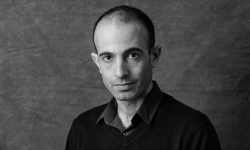Tim Adams in The Guardian:
 Yuval Noah Harari began his academic career as a researcher of medieval warfare. His early publications had titles like “Inter-frontal Cooperation in the Fourteenth Century and Edward III’s 1346 Campaign” or “The Military Role of the Frankish Turcopoles”. Then, the story goes, having won tenure at the Hebrew University of Jerusalem, he embarked on a crusade of his own. He was invited to teach a course that no one else in the faculty fancied – a broad-brush introduction to the whole of human activity on the planet. That course became a widely celebrated book, Sapiens, championed by Mark Zuckerberg, Bill Gates and Barack Obama, and translated into 40 languages. It satisfied perfectly an urgent desire for grand narrative in our fragmenting Buzz-fed world. The rest is macro-history. On almost every page of Sapiens, a bible of mankind’s cultural and economic and philosophical evolution, our millennial battles with plague and war and famine, Harari announced himself a Zen-like student of historical paradox: “We did not domesticate wheat,” he wrote, “wheat domesticated us”; or “How do you cause people to believe in an imagined order such as Christianity, democracy or capitalism? First, you never admit that the order is imagined.” The most intriguing section of a wildly intriguing book was the last. Harari’s history of our 75,000 years wound up, as all bibles are apt to do, with apocalyptic prophesy, a sense of an ending.
Yuval Noah Harari began his academic career as a researcher of medieval warfare. His early publications had titles like “Inter-frontal Cooperation in the Fourteenth Century and Edward III’s 1346 Campaign” or “The Military Role of the Frankish Turcopoles”. Then, the story goes, having won tenure at the Hebrew University of Jerusalem, he embarked on a crusade of his own. He was invited to teach a course that no one else in the faculty fancied – a broad-brush introduction to the whole of human activity on the planet. That course became a widely celebrated book, Sapiens, championed by Mark Zuckerberg, Bill Gates and Barack Obama, and translated into 40 languages. It satisfied perfectly an urgent desire for grand narrative in our fragmenting Buzz-fed world. The rest is macro-history. On almost every page of Sapiens, a bible of mankind’s cultural and economic and philosophical evolution, our millennial battles with plague and war and famine, Harari announced himself a Zen-like student of historical paradox: “We did not domesticate wheat,” he wrote, “wheat domesticated us”; or “How do you cause people to believe in an imagined order such as Christianity, democracy or capitalism? First, you never admit that the order is imagined.” The most intriguing section of a wildly intriguing book was the last. Harari’s history of our 75,000 years wound up, as all bibles are apt to do, with apocalyptic prophesy, a sense of an ending.
Humanity, Harari predicted, would engineer one more epochal event to rival the agricultural and scientific revolutions. Having evolved to exercise a measure of mastery over our environment, having begun to shape not only our planet, for better and worse, but also our biology, we stand, he argued, at the point of creating networked intelligences with a far greater capacity for reason than our own. The result was likely to be a lose-lose scenario for the species. Sapiens would disappear in the foreseeable future either because they had appropriated such mind-making powers as to become unrecognisable or because they had destroyed themselves through environmental catastrophe. Either way, judgment day was approaching. Like all great epics, Sapiens demanded a sequel. Homo Deus, in which that likely apocalyptic future is imagined in spooling detail, is that book. It is a highly seductive scenario planner for the numerous ways in which we might overreach ourselves. “Modernity is a deal,” Harari writes. “The entire contract can be summarised in a single phrase: humans agree to give up meaning in exchange for power.” That power, he suggests, may in the near term give us godlike attributes: the ability to extend lifespans and even cheat death, the agency to create new life forms, to become intelligent designers of our own Galapagos, the means to end war and famine and plague. There will be a price to pay for this power, however.
More here.
Toral Gajarawala at Dissent:
